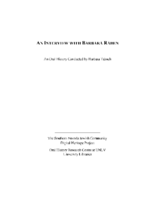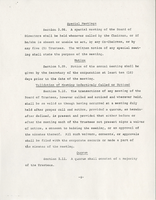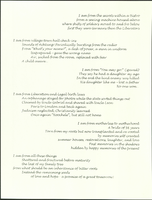Search the Special Collections and Archives Portal
Search Results

Transcript of roundtable interview about Kristallnacht with Esther Finder, Raymonde Fiol, Alexander Kuechel, Philipp Meinecke and Rabbi Felipe Goodman, by Barbara Tabach, March 17, 2015
Date
Archival Collection
Description
In this interview, the participants discuss their experiences during Kristallnacht, and the commemoration events in southern Nevada with Holocaust survivors and their families. Mr. Kuechel recounts his journey through concentration camps and being liberated by the Russians. Rabbi Goodman talks about meeting Mr. Meinecke, whose grandfather was a high-ranking SS officer. Meinecke discusses his upbringing in Germany and trying to learn about his family's involvement in the Holocaust, and the hope he felt after the fall of the Berlin Wall as Jews returned to Germany. The group discusses the importance of Holocaust education because there are still so many untold stories.
On November 9th to November 10th, 1938, in an incident known as Kristallnacht, Nazis in Germany torched synagogues, vandalized Jewish homes, schools and businesses, and killed close to one hundred Jews. In the aftermath of Kristallnacht, also called the Night of Broken Glass, some thirty thousand Jewish men were arrested and sent to Nazi concentration camps. German Jews had been subjected to repressive policies since 1933 when Nazi Party leader Adolph Hitler became chancellor of Germany. However, prior to Kristallnacht these Nazi policies had been primarily nonviolent. However, after Kristallnacht conditions for German Jews grew increasingly worse. During World War II, Hitler and the Nazis implemented their so-called final solution to what they referred to as "the Jewish problem" and carried out the systematic murder of some six million European Jews in what is now commonly known as the Holocaust.
Text

Transcript of interview with Ruth Urban by Barbara Tabach, August 24, 2015 and September 16, 2015
Date
Archival Collection
Description
In this interview, Urban discusses her upbringing in Las Vegas, and childhood friendships, many which came from within the Jewish community. She talks extensively about her professional career and passion for mediation as a strategy for problem-solving. In addition, Urban describes her community service commitments over the years, including her current role with Nevadans for the Common Good. Urban married Andrew Urban Jr. in 1983, and the couple have a son, Andrew Urban III.
Text

Transcript of interview with John Wanderer by Barbara Tabach, May 9, 2016 and May 18, 2016
Date
Archival Collection
Description
In this interview, Wanderer talks about his first career in auto mechanics and car racing, which developed out of a childhood passion, and eventually took him to Charlotte, North Carolina working for Holman and Moody. He then discusses the decision to move back to Las Vegas with wife, Dorothy (Dottie), to pursue his legal career. Wanderer reflects at length about his mother?s trailblazing legal career, and working with her as legal partners. In addition, Wanderer discusses politics, including his observations from the 2016 Democratic State Convention and running for Democratic Party National Committeeman.
Text

Transcript of interview with Adele Baratz by Steve McClenachan, March 3-4, 1979
Date
Archival Collection
Description
Interview with Adele Baratz by Steve McClenachan on March 3 and 4, 1979. In this interview, Baratz talks about growing up in Las Vegas and her her schooling. She graduated from Las Vegas High School in 1944, and discusses the rationing that took place during World War II. She went to Maryland for nursing school and returned to Las Vegas in 1947. She describes some of the hotels and casinos, and tells the story of her father trading property for an automobile in 1935. She also recalls the building of Hoover Dam, swimming in local pools, and going to Mount Charleston in the winter. The interviewer asks her about travel between Las Vegas and California and the impact of Atlantic City on Las Vegas tourism. Baratz then talks about her nursing career and starting a re-certification program in 1974 and the different hospitals in the area.
Text

Transcript of interview with Barbara Raben by Barbara Tabach, February 24, 2015
Date
Archival Collection
Description
Interview with Barbara Raben by Barbara Tabach on February 24, 2015. In the first part of the interview Raben discusses her involvement with Hadassah in Southern Nevada, and the various groups within that organization. During the second part of the interview, she talks about her family and her relationship to Judaism, and moving to Las Vegas in 1991. Raben discusses the business she built in Los Angeles and Las Vegas called the Candy Factory. She then talks about the formation of Midbar Kodesh with other families from Temple Beth Sholom. Raben continues to be involved in the Jewish community and the Jewish Family Service Agency.
In 1945, Barbara Raben was born to Kermit and Adele Shulman, children of Eastern European emigrants. She enjoyed a happy childhood in Stamford, Connecticut, and was raised with a strong Jewish identity. After attending college in New Jersey, Barbara married Richard Grisar, and the couple lived in London for a year, before returning to Stamford. In 1975, Barbara and Richard moved to Los Angeles where Barbara owned and operated a very successful candy business, Candy Factory. Sixteen years later, Barbara sold her business, and the family relocated permanently to Las Vegas, where her husband owned radio stations. Barbara has always been an active member of the Jewish community, wherever she lived, giving her time to synagogue, children's day school and service organizations. Upon arriving in Las Vegas, Barbara and her family were members of Temple Beth Sholom, before leaving the congregation to start Midbar Kodesh Temple with a small group of other families. She has been an active member of Hadassah Southern Nevada Chapter for over a decade, helping rebuild the organization locally after participating in the Hadassah Leadership Academy, a program designed to engage a younger generation of members. Currently, Barbara serves as board president and interim executive director for Jewish Family Service. In 2004, then a widow, she married Terry Raben. Barbara has four sons with her first husband: Michael, Andrew, David and Marc Grisar.
Text

Transcript of interviews with Louis Wiener, Jr. by Eleanor Johnson, January-February, 1990
Date
Archival Collection
Description
In this multi-part interview, Louis Wiener, Jr. discusses coming to Las Vegas from Pittsburgh at a young age, attending Las Vegas High School and University of Nevada Reno. He attended law school at University of California at Berkeley and passed the Nevada State Bar in 1941. He established a practice, Jones, Wiener and Jones, with Bob Jones and Cliff Jones and later with Herb Jones. He had another practice with Neil Galatz and Dave Goldwater, retiring in 1988. Wiener had other business ventures that allowed him to do pro bono work as a lawyer. Wiener discusses his family, including former spouses, his children, and various aspects of his career as an attorney in Las Vegas, representing hotels in the Greenspun antitrust lawsuit, and as an attorney for Bugsy Siegel. He says of his success, "I'm just lucky. I was here at the right time and I picked the right people to help."
Text

By-laws of the Nathan Adelson Hospice, November 30, 1978
Date
Archival Collection
Description
The by-laws of the Nathan Adelson Hospice establish the purpose and organization of the program, founded in 1978 in Las Vegas.
Text

Compositions by Raymonde Fiol, 2012
Date
Archival Collection
Description
Biography, essay and poem written and compiled by Raymonde Fiol, titled Pieces of My Life.
Text

Transcript of interview with Mike and Sallie Gordon by Adriane Massa, March 2, 1977
Date
Archival Collection
Description
Mike Gordon speaks about their liquor stores and lists his occupation as a bartender. Among the civic organizations that he participated in were: Young Democrats, Eagles Lodge, Lions Club, past president of Temple Beth Sholom and B'nai B'rith Lodge. Together Mike and Sallie recall the growth and changes of the valley they have witnessed between the early 1930s and mid-1970s. Among his anecdotes is one about the carrying of payroll checks to Boulder Dam to avoid "interference" (robberies).
Mike and Sallie were among the very first people of Jewish ancestry to make their way to Las Vegas. They arrived January 26, 1932 to join relatives of Sallie?s who had moved to Las Vegas when the Boulder Dam construction began. They had married in 1930 in Pittsburgh, Pennsylvania. Soon they were involved members of a small but growing group of Jewish pioneers and helped found Temple Beth Sholom, the community?s first synagogue. Mike speaks about their liquor stores and lists his occupation as a bartender. Among the civic organizations that he participated in were: Young Democrats, Eagles Lodge, Lions Club, past president of Temple Beth Sholom and B?nai B?rith Lodge. Together Mike and Sallie recall the growth and changes of the valley they have witnessed between the early 1930s and mid-1970s. Among his anecdotes is one about the carrying of payroll checks to Boulder Dam to avoid ?interference? (robberies).
Text

Transcript of interview with Lori Chenin-Frankl by Barbara Tabach, June 7, 2016
Date
Archival Collection
Description
Lori provides a wonderful narrative of her Judaism, her love of teaching children and her devotion to family and music. She talks about growing up in Las Vegas and becoming a bat mitzvah, a rarity for girls in 1973. Throughout her life, including the period where she moved around with her Air Force husband, she sought Jewish connections to help her feel at home no matter where she was.
Text
